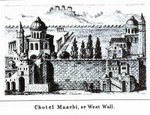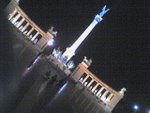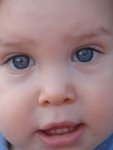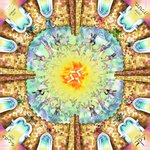From nehora.com:
Rabbi Meshulam Zusha of Anipoli
Popularly known as Reb Zusha.
One of the most cherished of the chasidic masters, Rabbi Meshulam Zusha was the younger brother of the famous Rabbi Elimelech of Lizhensk, the Noam Elimelech. The two brothers joined the circle of disciples of the Maggid of Mezritch. R' Zisha soon excelled in his studies and gained the admiration of his fellow students for his deep piety. Rabbi Shnuer Zalman of Liadi, said about him: "His prayers were uttered with an intensity and awe that is beyond compare." He combined a self-effacing devotion and attachment to God with an ardent love for the Jewish people, sharing their joys, bearing their burdens. The people reciprocated, flocking to him in large masses. They saw in him a tzaddik and a guide, but above all a champion and a defender. He was the rebbe who recognized only goodness. In his final years he suffered from a protracted illness, but he never complained. "Whatever comes from God is good," he would say. The final resting place of this beloved chasidic rebbe is beside the grave of his mentor, the Maggid of Mezritch.
Rabbi Zusha did not write any books. His reflections and commentaries, which are scattered among the works of his students, were compiled under the title Menorat Zahav. He was succeeded by his son Rabbi Tzvi Menachem Mendel.
From rishon-rishon.com:
The Magid of Mezeritch was the spiritual heir of the Ba`al Shem Tov. One day someone came to him with a question: "The Talmud tells us we should bless God for the bad things that happen to us, just as we bless Him for the good. How is it possible to do such a thing?" The Magid of Mezeritch replied, "For that you must go to Reb Zusha of Anipoli."
So the man went to visit Reb Zusha of Anipoli. When he got there, he found Reb Zusha living in great poverty, his family was beset by affliction and disease. Yet, Reb Zusha greeted him cheerfully. "The Magid of Mezeritch has sent me," he said, "to learn from you how it is possible to bless God for the bad things that happen to us as, just as we bless Him for the good."
Reb Zusha thought for a while. "I am sorry," he finally replied, "I cannot answer your question - nothing bad has ever happened to me."
More quotes:
"If it were offered to me to exchange places with Abraham, I would refuse. What would God gain from this? He'd still have one Zusha and one Abraham."
"When I appear before the heavenly court they will not ask, 'Why weren't you Moses'. They will ask, 'Why weren't you Zusha'."
Subscribe to:
Post Comments (Atom)

















No comments:
Post a Comment